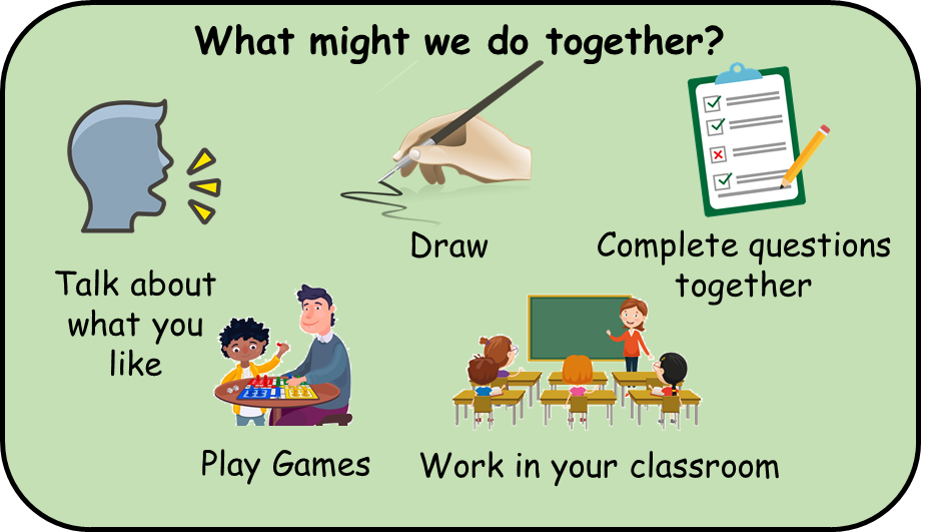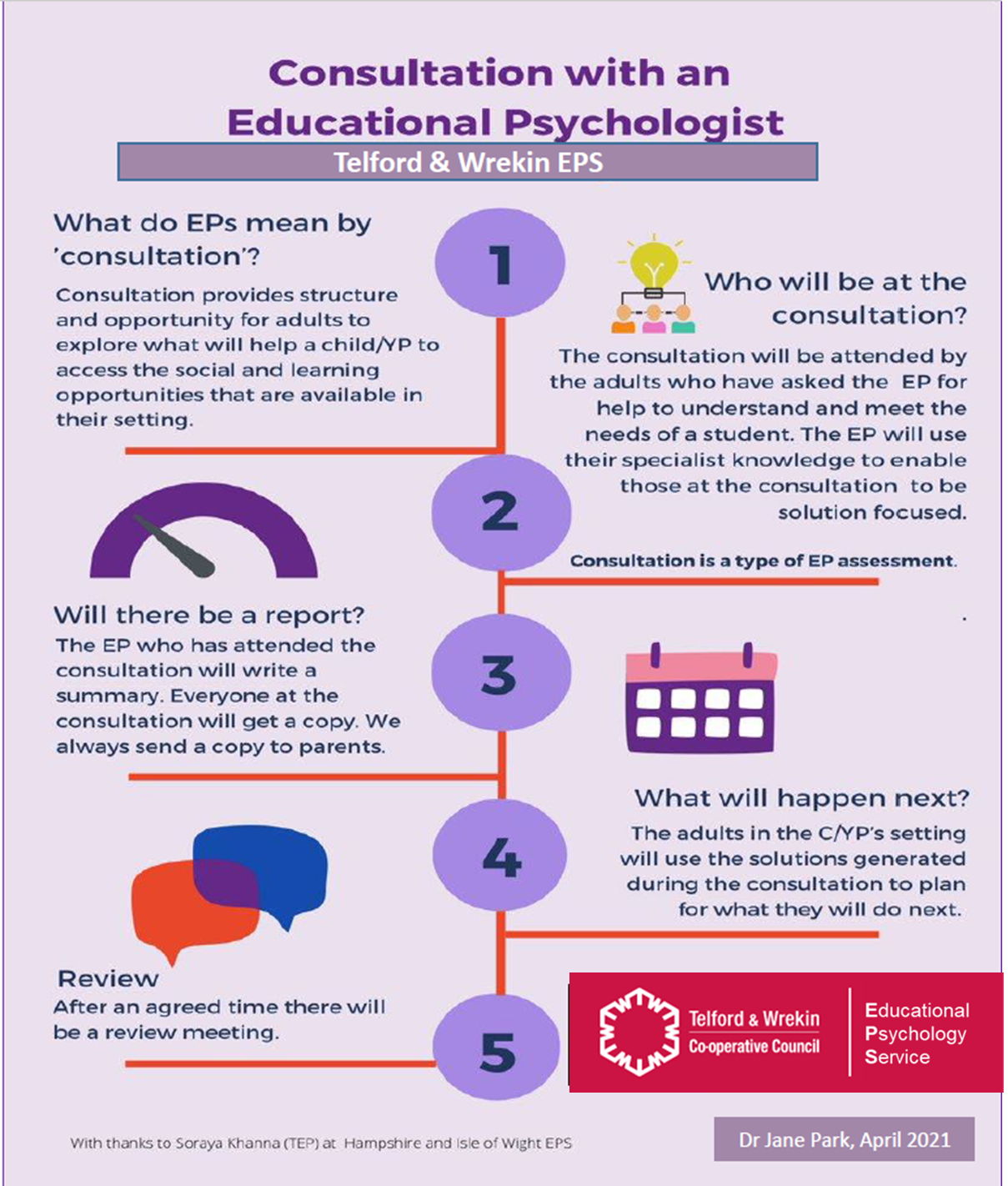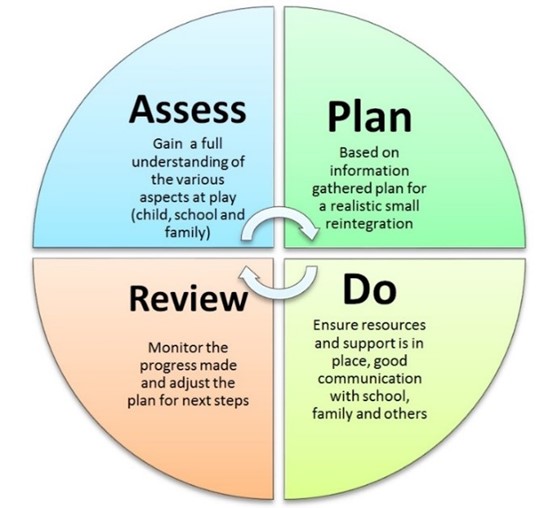This page provides information for families and young people who may be involved with an educational psychologist from Telford and Wrekin.
What is an Educational Psychologist?
An Educational Psychologist (EP) works with young people (0-25), families and schools, to support their learning and wellbeing. Educational Psychologists are trained in many aspects of psychology and have a diverse understanding of how children develop. EPs use psychology to help young people and families understand their situations and how to move forward.
Information for family and young people
Use the links below to explore information about the EPS and how they work with families and young people. If your question isn't answered here, please contact your school's SENCO.
What might an Educational Psychologist do?
Educational psychologists support schools and families in many different ways. Their work can take many different forms and may involve working with families and young people directly or looking at the educational setting at a systemic level. Often, EPs visit educational settings to support young people with their learning, wellbeing and experience in school.
EPs work with many different young people of different ages, including early years and young people who are preparing for adulthood. Their work will often involve listening and understanding the situation from many different perspectives including, parents, carers, school teachers, teaching assistants and young people.
EPs use these perspectives and psychology to generate questions about the young person’s current situation and explore with the family, staff and young person ways these questions can be answered to help the young person and family move forward. Often, teachers, young people or parents may best be suited to answer these questions as they know the young person best. EPs can support with this process by bringing their knowledge of child development and psychology.
EPs support a range of different situations, including the wellbeing and mental health of families, young people and teachers, assisting children's learning, and leading training in different areas of psychology to support school staff.
How does an Educational Psychologist become involved with a young person?
The school’s Special Educational Needs Co-ordinator (SENCO) may talk to an EP about further guidance and support a young person may need if they are concerned. If the Educational Psychologist agrees that further support is needed, the school will ask parents to provide written and signed consent, for the EP to work with the family and the young person. Referrals to the Educational psychology service are completed through schools. An EP may then speak with the parents and family before completing work in schools to gain a greater understanding of the situation. An Educational Psychologist may send a One Page Profile to the school, so the young person can see and learn a little bit about who they are. The one page profile will also contain some information of what that EP may do in school and how young people and families can prepare. See an example here.
During a visit to an educational setting
From speaking with staff an Educational Psychologist may decide they need to see the young person within school. This can sometimes lead to an EP or an Assistant psychologist (AP) visiting a young person in school and completing some work directly with them. The work an EP completes within a school can take many different forms, but often it can involve:
- Completing an observation of a young person in their classroom or at break/lunch time
- Talking with a young person and asking them to complete activities that explore their views
- Completing games or activities with a young person to understand how they may learn
- Running interventions with a whole class or group of children
- Leading a consultation with staff and parents in order to understand the situation from different points of view

Consultation
An EP will often have direct contact with parents and carers and may invite them to a meeting, often called a consultation, with a school to hear the views and
experiences of all involved. The Educational Psychologist will then use all of the information to plan next steps, goals or outcomes to support a young person with everyone involved. These steps are agreed by a whole team to ensure everyone is clear about the actions that are happening, who is completing them and when they are aimed to be achieved by.

What happens after an Educational Psychologist visits?
The school will use their new understanding and information to support the young person and put techniques and interventions in place. This process is often referred to as an APDR (Assess, Plan, Do Review) and is part of a school’s graduated response (more information about this process can be sought via the SEND local offer).
Sometimes, a written record will be sent to the school and shared with parents. This will summarise the work the EP completed in the school and the agreed actions. However, all actions will take place from the agreed date within the meeting and are not subject to a written report. An EP will usually review the work with parents and staff later in the year, to evaluate progress and help staff to continue to move forwards supporting the young person and address any new situations that arise.

How else may an educational psychologist be involved with a young person?
Educational Psychologists can be involved with young people through the Educational Health Care Needs Assessment process. Within this process, EPs provide psychological advice about the situation with the young person, presenting their views and strengths. As well as this, EPs will provide areas that the young person needs support in and recommends approaches that can be used to facilitate this.
For more information about the EHCP process visit the Local Offer.
Telford EPS also supports and works closely with the Child Development Centre (CDC) at stepping stones. Educational Psychologists are currently supporting with the Communication and Interaction (C&I) assessment pathway for Autism with children under 5 year of age. As part of this process, an Educational Psychologist may visit your child in their nursery or early years setting and will support parents and schools with appropriate provision as they move forward to school. More information about this process can be found on the CDC website.

Information for Families and Young People |
Information for Educational Settings |
Frequently Used Approaches |
About us
|




